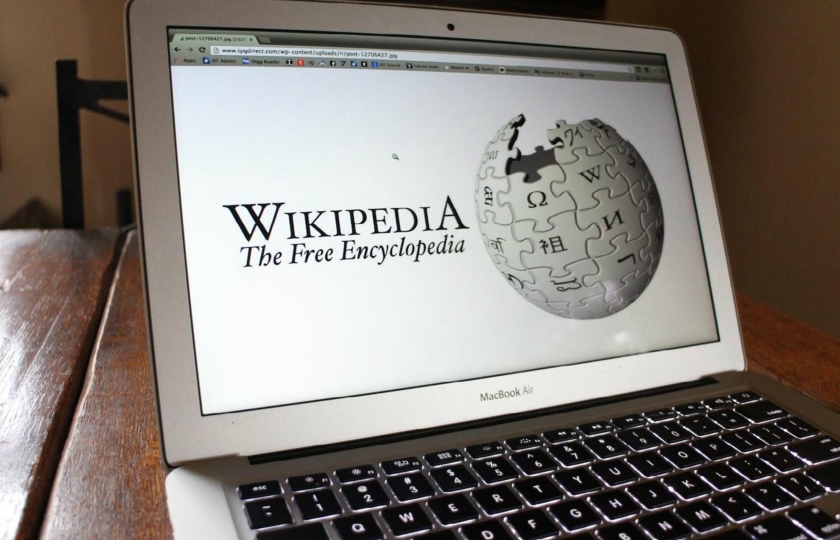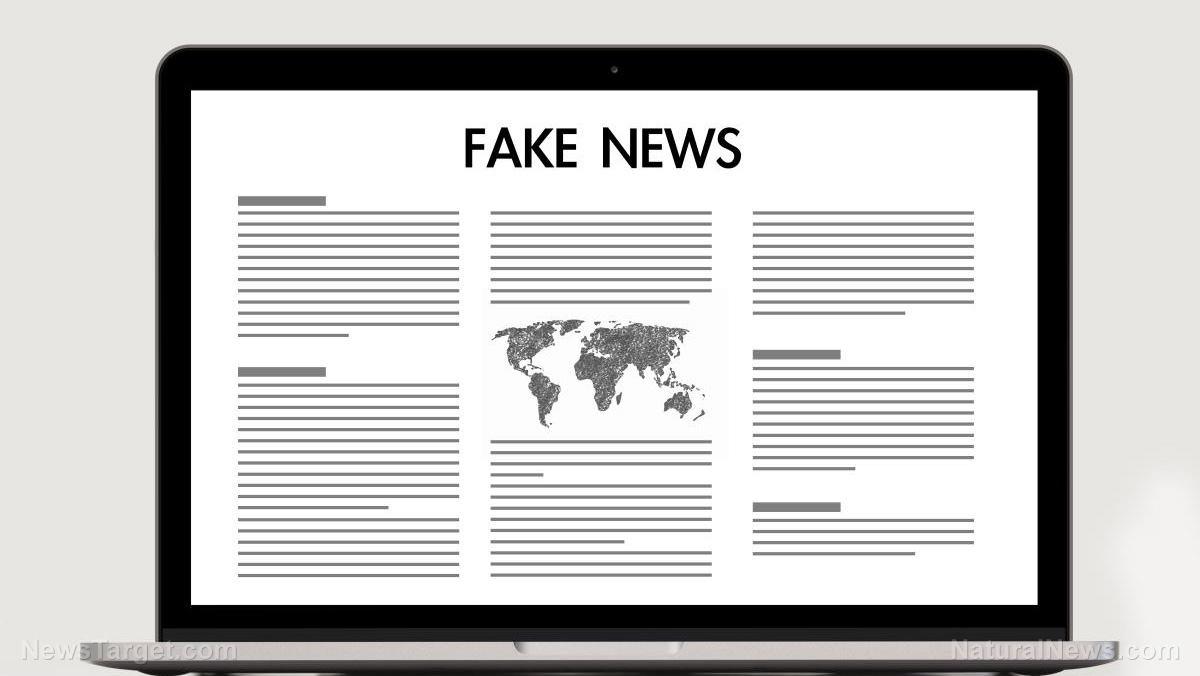Wikipedia: Our new technological McCarthyism, Part Two
04/28/2019 / By News Editors

In Part One, we discussed the threats social media technology poses to a healthy and educated populace, the scientist cult of Skepticism and its extremist medical wing, and the online encyclopedia Wikipedia as a leading promulgator for Skepticism’s agenda. In Part Two, we go deeper into the Science-Based Medical faction and its advancing an unfounded and authoritarian interpretation about science.
(Article by Richard Gale and Gary Null republished from PRN.fm)
Science-Based Medicine (SBM) is a recent splinter faction, a break-away group, from Evidence-Based Medicine (EBM). EBM is often recognized as one of the great advances in modern medicine to emerge during the 20th century. Although SBM endorses EBM’s premises and principles, it also regards it as incomplete. Consequently SBM blatantly hails itself as the future paradigm for evaluating medical science and recommending best practices and treatments.
First posited as a new and precise methodology for evaluating medical research in 1993, EBM has rapidly become the dominant statistical and clinical model for developing healthcare strategies in clinical settings. It is also the most prevalent theory in use today for determining the accuracy of peer-reviewed journal articles, clinical trials and medical claims to improve healthcare decisions. According to the British Medical Journal, EBM is now the “new paradigm for teaching and practicing clinical medicine.”[1] The renowned Cochrane Database Collaboration, a network of 37,000 professors, doctors and researchers from over 130 countries, is one of EBM’s more successful contributions. Cochrane performs meta-analysis on existing scientific literature for pharmaceutical drugs, vaccines and supplemental products alike to determine the credibility of their health claims. Medical journals increasingly fail to maintain high standards for the research published. Prestigious journals such as the New England Journal of Medicine have even criticized their own publications for publishing scientifically invalid research funded by drug companies and professional associations biased towards the pharmaceutical products they develop and promote.[2] Medical journals are also riddled with authorship violations of ghostwriting, which are threatening the integrity of reliable medical literature.[3] SBM physicians would seem to fully endorse these practices.
For example, SBM proponents give their full weight in support of biased studies promoting selective serotonin reuptake inhibitor (SSRI) drugs for treating anxiety and depression against the large body of research indicating their ineffectiveness and serious adverse effects. The research for drugs treating clinical depression were so poor, that the Journal of the American Medical Association launched a policy to refuse any industry sponsored submissions unless all the trials’ original data could be reviewed by independent, non-pharmaceutical industry editors.[4] Consequently, by identifying such problems and falsehoods, Cochrane is today’s important watchdog for targeting bogus pharmaceutical research and for separating reliable clinical science from junk science.
However, EBM also has its detractors within the conventional medical community. Most EBM studies rely exclusively on data collection, epidemiological research and statistical analysis. It may be noted that EBM’s ascendency parallels the rise of the information age and Internet, and follows the idea that gathering and possessing huge amounts of data can be a weapon, regardless whether it is to leverage a political party or to find the best strategy to treat a life-threatening disease. For example, Paul Offit habitually references fourteen EBM studies that have become the CDC’s and pro-vaccine lobby’s gospel to discredit an association between vaccines and autism.[5] Each study is limited to epidemiological and population data analysis. None meet the gold standard criteria of a double-blind, authentic placebo controlled trial, which is the most reliable criteria for decisive evidence about a vaccine’s efficacy and safety.[6] And this is another one of EBM’s failures: inflating epidemiological results and assigning it with an equal level certainty as gold standard and biological clinical trials.
Another crucial criticism is that EBM has been misappropriated by private commercial interests, in particular the drug companies and their cohorts in the CDC and FDA that regulate research agendas. Dr. Trisha Greehalgh at the London School of Medicine wrote an essay for the British Medical Journal, “Evidence Based Medicine: A Movement in Crisis,” noting that EBM was unable to adequately detect the biases in pharmaceutical industry sponsored studies. Overall, Greenhalgh felt that after twenty years EBM has only made marginal gains.[7] This is a subject requiring greater investigation because it is our observation that there may be a strong correlation between healthcare’s over-reliance upon EBM guidelines for treating disease and the continual increase in cases of iatrogenic injuries and deaths due to medical intervention. Iatrogeneic medical error is now the third leading cause of mortality in the US. Is there a direct correlation? Well, if we follow SBM’s scientific reasoning, it is plausible. In our opinion, EBM suffers from a mistaken uniformity, a cacophony of conflicting research data and false conclusions. Furthermore, it too often fails in its attempts to advance efficient and safe medical interventions, including alternative medical findings, into actual clinical practice within the medical community.
Due to EBM’s shortcomings, an group who earlier advocated for EBM emerged. The Society for Science Based Medicine, founded by Yale neuroscientist Steven Novella, was launched to advocate for a reductionist scientific rationality, founded upon Skepticism’s principles and strategies. In 2009, the Society launched its Institute for Science in Medicine, a non-profit organization with a mission to influence public health policies and establish standards based upon its medical determinism at the exclusion of other medical options that the Institute criticizes. High on both the Society’s and Institute’s priority list is the condemnation of Complementary-Alternative Medicine (CAM), which is today offered in most university medical schools. It also accuses naturopathy, homeopathy, massage, chiropractic medicine, nutritional medicine including supplements, and all faith-based and Mind-Body healing modalities of quackery.[8] Practitioners of these non-drug based therapies are categorically labeled as irrational, charlatans, conspiracy theorists or quacks. Followers of SBM operate solely in the state of its absolute authority, hyper-diligence and ultra-orthodoxy. Medical research favoring conventional medicine is framed as unwavering facts, which leave no room for open discussion and debate.
SBM can also be understood as a symptom of our society’s addiction to technology. Noted earlier, SBM operates primarily in the cyber spheres rather than laboratories and professional clinical settings. Richard Stivers, a distinguished sociology professor at Illinois State University documents the pathologies of a technological society. According to Stivers, our modern “technological civilization” makes no effort to promote or encourage a “moral community.” In fact, he believes the entire social media environment built upon modern technology and social platforms is mentally debilitating and contributing to our culture’s disease or sociosis.[9] After reading SBM articles, and its litany of diatribes and condemnations about everything SBM abhors, one readily observes the depth of this movement’s intolerance.
The Skeptic organizations are remarkably efficient in the dissemination of their worldview and wherever one finds criticisms about alternative health natural medicine, SBM articles and its predecessor Quackwatch website are cited. During our own interaction with MediaWiki’s legal department, Wikipedia administrators acknowledge QuackWatch as a reliable reference for editing pages. As an aside, Quackwatch’s founder and Skeptic Dr. Stephen Barret has been slapped with many lawsuits.[10] In one California trial, it was revealed that Barrett had failed his board certification exams but was still hanging up a shingle for his psychiatric practice.[11] None of this will be found on his Wikipedia page although many attempts have been made. Barrett’s Wikipedia personality is completely safeguarded by Skepticism’s individuals.
SBM is strictly a community of university professors and medical doctors. Very few have the luxury to spend hours day and night to survey the internet for people and groups to endlessly attack on blogs or monitor Wikipedia edits they disapprove of. Nor do most of them have the technological computer skills. To succeed in promulgating its ideology, they have recruited their admirers in the Skeptic organizations listed in our earlier segment to this series.
The MediaWiki Foundation has few professional paid editors on staff, although its employees function as administrators to handle the more vicious “wiki wars”. Instead it seeks and welcomes outside organizations and groups to recruit contributors “to work together as a team to improve Wikipedia.” These groups are known as WikiProjects and receive the full endorsement of Jimmy Wales and the Foundation. Among these WikiProjects is the Skepticism group. If you visit the WikiProject:Skeptism page, the group’s complete agenda and targets for editorial discord are outlined with calls for editorial action. The list of alternative health practices that the Project indicts is thorough, including Chinese and Indian Ayurveda medicine, meditation, chiropractic and homeopathy, naturopathy, energy and massage therapies, nutritional healing, nutritional therapy, supplements, health food and much more. Other Skeptic targets for cyber agitation fall under separate headings such as paranormal, psychology, religion and spirituality with their own WikiProjects.
One group that has received Wikipedia’s full support and swallowed Dawkin’s “militant atheism” whole with steroids is Guerrilla Skepticism on Wikipedia (GSoW), founded by Susan Gerbic. GSoW actively seeks out and trains recruits to serve as an army of a Skeptic editors to wage wiki wars against those who research or advocate alternative medical treatment modalities. These are the most active of Wikipedia’s independent advocates editing alternative medicine content and pages critical of conventional drugs.
Gerbic speaks about her organization’s guerrilla tactics on Wikipedia openly. On the Skeptic website Skeptoid, she writes in her article “Helping Build a Skeptical, Scientific Wikipedia,” that Wikipedia’s Skepticism is “one of the most amazing powerful projects that exists today in the world of scientific skepticism. That project is Wikipedia…. The information inside Wikipedia is so influential and powerful that we, as skeptics, need to make sure that the reader is getting correct information and leaving notable citations that they can follow if they want more information.”[12]
On her personal Wikipedia biographical entry, Gerbic is quoted as saying, “We rewrite Wikipedia, and proof the pages, we remove citations that are not noteworthy, we add citations, we do just about everything in Wikipedia to improve content.”[13] Of course, the majority of their “notable citations” reference back to Skeptic and SBM sources, such as Gorski’s ScienceBasedMedicine blog. “Improvements” are solely aligned with Skepticism’s doctrine. Gerbic’s other organization Skeptic Action is another stealth guerilla operation to disseminate cyber tasks for Skeptic trolls on Twitter, Facebook and Google+ to rapidly rate pages such as books listed on Amazon that question vaccination, homeopathy, and natural cancer treatments. Skeptic Action also utilizes a community drive system, which enables members to receive rapid alerts to rebut content posted on the internet.
In April 2017, Wales launched his new WikiTribune. This new “wiki” is supposed to combat fake news. Wales stated that the project, “will be the first time that professional journalists and citizen journalists will work side-by-side as equals writing stories as they happen.”[14] Although his motivation is praiseworthy, in light of how fake news brought Trump into power according to Wales, we can expect the results to be equally dubious based upon Wikipedia’s past. He doesn’t explain or provide information about who qualifies as a reliable “professional” journalist. Will it be more uninformed writers promoting drug-based medicine? More Skeptical laypersons covering up for the sins of big agricultural companies? And the term “citizen” journalist is utterly meaningless and will invite more of the same confusion and chaos that plagues the encyclopedia. Consequently in our opinion, WikiTribune is already on the path to being another news source of prejudice, intolerance and unfairness.
Is the encyclopedia’s chaos and unmanageability, under the ruse of democratic principles and opposition to internet censorship, intentional so the doors are left wide open for Skepticism to indoctrinate Wikipedia’s users to its cause? Or has Wikipedia intentionally enabled the Skeptics to be the final judges on alternative health, medical controversies and many other subjects that Skeptics despise?
Some examples provide clues. The Wikipedia page for Science-Based Medicine is empty of criticism and controversy, of which there are many from highly factual sources. Edits on the SBM page are seemingly locked. In addition to adulating SBM’s founders, Steven Novella and David Gorski, the entry only praises the movement for being “noted as an influential and respected source of information about medical controversies and alternative medicine.” Likewise practically all of Skepticisms’ leading voices have squeaky clean biographies. Contrary evaluations with confirmatory evidence, which should be entered on these pages for encyclopedic accuracy, are systematically censored.[15]
In 2014, Change.org posted a petition for Wikipedia users to stop donating to the site because of the preferential treatment given to Skeptics to ridicule and viciously condemn Energy Medicine and Psychology. The petition gained over 11,200 signatures.[16] In response, Wales wrote:
“No, you have to be kidding me. Every single person who signed this petition needs to go back and check their premises and think harder about what it means to be honest, factual and truthful. Wikipedia’s policies around this kind of thing are exactly spot-on and correct. If you can get your work published in respectable journals, that is to say, if you can produce evidence through replicable scientific experiments, then Wikipedia will cover it appropriately. What we won’t do is pretend that the work of lunatic charlatans is equivalent of ‘true scientific discourse.’ It isn’t.”[17]
“Lunatic charlatans?” A word taken directly from Skepticisms’ lexicon.
In this particular case, Debby Vajda, President for the Association for Comprehensive Energy Psychology (ACEP), provided 51 peer-reviewed articles and studies, 18 which were randomized controlled studies, appearing in professional journals, including the American Psychological Association, the Journal of Clinical Psychology, the Journal of Nervous and Mental Diseases, Psychotherapy Theory Research and Practice and others showing positive statistical results outside the range of chance. She commented on Change.org, “Every edit to the energy psychology Wikipedia page that attempts to reference findings from these well-respected, scientific journals is summarily deleted… The American Psychological Association does not think we are ‘lunatic charlatans.’ Neither does the Association of Social Work Boards, the National Board of Certified Counselors, or the National Association of Alcohol and Drug Abuse Counselors, all of which approve ACEP to provide continuing education to their professional members for the study of energy psychology. The Wikipedia page is out of step with existing peer-reviewed research on this topic, and opinionated, self-described “skeptic” editors are resisting any change.”[18]
Apparently the scientific evidence was insufficient to pass Wikipedia’s administration review. The page still defines Energy Medicine as a “pseudo-scientific belief.”[19]
Other petitions against Wikipedia posted on Change.org add further light about these prejudices and preferential treatment towards Skepticism. Wikipedia earlier disabled editing on its Homeopathy page in order to retain the Skeptic’s edits to debunk it and editors have been put on probation.[20] Wikipedia’s opening paragraph, states “Homeopathy is a pseudoscience – a belief that is incorrectly presented as scientific. Homeopathic preparations are not effective for treating any condition.”[21]
Homeopathy is an excellent example of Skepticism’s unsound and frequently unsubstantiated criticisms. Simply because SBM physicians may not understand biophysics, quantum energy, and physical properties of water should not close the door on homeopathy as mere quackery. Surely Skeptics will embrace the value of nanotechnology without understanding the physics of spatial quantum confinement behind it. Nanomedince is rapidly becoming part of conventional medicine’s drug arsenals. Safety studies for nano-drugs are weak at best. Yet there are analogous features to nanotechnology and homeopathic theory in terms of spatial physics and force. Furthermore, in Europe, homeopathy is a preferred alternative treatment modality among doctors. In India, where it is most popular, 62% of homeopathic users have never tried conventional drugs, and 82% of those in an AC Nielsen survey said they would not switch to allopathic treatments. In France, 94% of surveyed pharmacists acknowledged they recommend pregnant women to use homeopathic remedies instead of pharmaceutical drugs. Homeopathy is also taught in 21 of 24 French pharmacology schools. Seventy percent of French physicians approve of the discipline.[22]
Unfortunately, if you wish to include this information into Wikipedia’s homeopathy page, you will fail dismally. Once you make your edits, anonymous Skeptic editors will have been tipped off about the change, descend like delirious banshees, and change the text back to its original. If you are fortunate, they will forget to advocate for your banishment from editing Wikipedia pages in the future.
Another petition charged that Wikipedia’s acupuncture page was in direct violation of its “neutral point of view policy.” Again, like the other examples above, Wikipedia has assured that acupuncture will be immediately perceived as a useless therapy. The opening paragraph to Wikipedia’s acupuncture page states, “TCM [Traditionial Chinese Medicine] theory and practice are not based upon scientific knowledge, and acupuncture is a pseudoscience.”[23] The petition received an enormous number of signatures from China where acupuncture stands alongside conventional medicine in clinics throughout the country. It is hard to imagine a Chinese medical doctor, trained at Harvard Medical School, questioning acupuncture’s efficacy for many ailments and illnesses. The petition also cites the fanatical militant Guerilla Skepticism on Wikipedia as the primary editors and administrators on the acupuncture page.[24]
The good news is that Skepticism and SBM are rapidly losing touch with today’s health and social trends. Its scientific cherry-picking, inverted conspiratorial mentality, and refusal to recognize scientific facts contrary to their rigid beliefs, such as the huge body of evidence discrediting the safety claims of genetically modified foods and vaccines, are losing popular ground. Its own bias towards that which it lacks knowledge and refuses to understand has given rise to Skepticism’s own intrinsic conspiratorial theories and misguided perceptions of humanity and the human condition. Eventually SBM will be remembered as BS-Based Medicine because real science continues to make new discoveries beyond reductionist certainties. Without its hidden funders and Wikipedia supporters, it might deservingly collapse into the dustbin of history sooner.
Although the Skeptics currently rule the flow of information over Wikipedia, and have made considerable gains on Facebook and other online sites, they are failing in the university medical departments where future generations of physicians and health practitioners will graduate and enter the healthcare workforce. In 2011, US News and World Report reported that 40% of American adults swore by some form of alternative and natural, non-drug based medicine, and 46 medical schools had CAM departments.[25] Steven Novella was characteristically swift to denounce the report with his customary nonsense.[26] Four years later, the Association of American Medical Colleges reported that 126 of 132 medical schools across the nation offered required courses in alternative medicine. That same year, a survey and analysis published in the Journal of Advanced Medical Education Practice, among the 127 different CAM course listings gathered in the study, the most frequent were traditional natural medicine, acupuncture, spirituality and herbology. Twenty-five percent of courses were associated with personal growth and self-care practiced alongside CAM and conventional medical protocols.[27]
In the largest national survey of its kind, researchers from UCLA and the University of California, San Diego, measured medical students’ attitudes and beliefs about complementary and alternative medicine (CAM). The survey found that 84% of medical students believe that conventional medicine would benefit from natural integrative and complementary beliefs, ideas and treatment modalities. Seventy-seven percent felt conventional physicians who learned other complementary medical disciplines would benefit their patients.[28]
Furthermore, today’s younger generations also make up the largest percentage of vegetarians and vegans in the national population. They are better aware of the adverse effects of the standard American diet and the risks of consuming genetically modified foods and pesticide-tainted produce. This may be largely due to their experiences after having watched parents, grandparents, siblings and loved ones whither away from over prescribed medications with no alternative offered. Many have witnessed the degeneration and death of loved ones due to poor diet, nutritional deficiencies, lack of access to and refusal of the medical establishment to offer treatments such as acupuncture, nutritional supplementation, and energy medicine. And they have seen the human cost of drugs’ adverse effects themselves. At the same time, many younger students have also observed improvements and healings when their elders adopt integrative and alternative treatments. Noted above, “death by medicine,”according to the British Medical Journal, is the third leading cause of mortality.[29] Fundamentalist physicians such as oncologist David Gorski only possesses chemotherapy and surgery in their medical toolboxes. Truth be told, SBM are harbingers of mortality and are contributing greatly to the suffering patients face from conventional medical practices alone, and the dangers and health risks peddled by physicians who buy into SBM’s propaganda. And Wikipedia has become their major mouthpiece publishing disinformation about alternative therapies that are nothing less than negligent and perhaps even criminal.
In more recent years, the American Medical Students Association has sponsored an Integrative Medicine Day. SBM leaders Novella and Gorski have damned this effort as “quackademic medicine” and have published articles excoriating the study of natural health treatments as a threat to science.[30] CAM science writer David Freedman called the medical Skeptics “prickly anti-alternative medicine warriors.”[31]
With over 137,000 volunteer editors, Wikipedia opens its gates to everyone to infuse the encyclopedia’s pages with personal biases, opinions and misinformation. Surely the vast majority are sincere and hold a deep desire to share their professional expertise on a given subject and make it available to the world. An Oxford professor who has taught and written about Shakespeare or a geologist writing about the physical properties of volcanic ash, would certainly have a more genuine motivation to contribute to Wikipedia’s mission than a troll hired by PR firm to edit out the health risks of Monstanto’s Roundup herbicide, or Gerbic’s followers who want to convert the world population to scientific Skepticism.
In our opinion, there are many other online encyclopedias with far more integrity and objectivity than Wikipedia to donate to. Among them are Encyclopedia Britannica Online (requires an annual fee), Citizendium (started by the originator of Wikipedia Larry Sanger), Encyclopedia.com, and Bartleby that include the Columbia encyclopedia. Scholarpedia is similar to Wikipedia and far more reliable and recognized by more universities as a legitimate resource for research.
Second, communicate and encourage others on your social media platforms to donate to other causes rather than fund Wikipedia’s ideological collaborators. Popular grassroots efforts to encourage divestment from corporations engaged in destructive and inhumane activities has had some remarkable successes. Organizations promoting Palestinian rights led a divestment campaign and boycott of the Israeli cosmetic company Ahava. There have been successful efforts to force foreign companies in the France, Kuwait, Netherlands, Sweden, UK and US to drop their business relationships with Israeli firms known to support the apartheid of Palestine.[32] A New York Times article in 2015 noted the success in divestment efforts to stigmatize and inflict financial injury to the fossil fuel industry. Investors controlling over $5 trillion in assets are now forcing stocks to drop.[33] These successes have contributed to building a stronger movement to challenge the leading culprits of global warming. Students from over 300 campuses, deeply worried about their institutions’ financial interests in major corporate polluters have launched divestment campaigns with moderate success.[34]
Wikipedia claims it survives solely upon users’ donations to continue its annual growth. However, we hold suspicions to this claim. We don’t know whether Wikipedia provides services in exchange for fees disguised as donations. This may be a legal issue for the IRS. With the loss of a free internet and blocking, censoring and banning websites, including many legitimate, reliable alternative news sites hosting honest, seasoned and respectable journalists and scholars, it is incumbent upon people to act upon their conscience to boycott and withhold donations and fees from sites that are adversaries to free speech and curtail the dissemination of information. The Deep State is hypothetically more than federal intelligence agencies and corporate interests. It need not be perceived as conspiratorial; rather it is a mindset that misinforms and presents itself to the public as something other than what it truly is. The most effective way to confront it is simply to expose it, bring it out of the shadows into the public light so people can discern for themselves Wikipedia’s moral compass and act accordingly.
Unfortunately there is only a small fraction of Americans who truly care. Where is the desire for Congressional hearings into the abuse of Google, YouTube and Wikipedia? Where is the #MeToo movement to protest these blatant invasions into our lives? At the moment, there is no movement. The Executive, Senate, House and mainstream media, notably the New York Times and Washington Post, are not concerned. Everything we know today about the dangers of the third rail, everything we were told about the adverse consequences of surrendering our freedoms to our mobile phones, is ignored. We are adrift in a utopian stupor that the latest electronic gadgets and technologies will only improve our lives and more. What thought is given to its downside and how it will infect us? Fortunately there are brilliant advocates, messengers of warning, such as the late Robert Perry, Cornel West, Chris Hedges, Glen Ford and others; but they too and their media outlets are also being censored. Important alternative news sites such as Consortium News, Truthdig, Counterpunch, Naked Capitalism, Oped News and others have been targeted to limit our access to read the stories on the other side of the fence.
Wikipedia is embedded skeptic groups that attack those who would tell us the truth, the guardians of the social media galaxy. We are brainwashed 24-7 without warning. No trepidation. No open debate. We are solely passive consumers in the wiki matrix. Objectivists, as The Economist article notes, functions best when social conditions reinforce a bee-hive mentality. This is what enables Skeptic leaders to cling to their perceptions of intellectual superiority. In the meantime we have a compliant nation, a population obedient and only buying.
Read more at: PRN.fm
Tagged Under: banned, Big Tech, Censorship, denials, disinfo, Facebook, fascism, First Amendment, free speech, Glitch, Instagram, shadow banning, Social media, social media giants, tech giants, tech tyrants, Twitter, Wikipedia

















